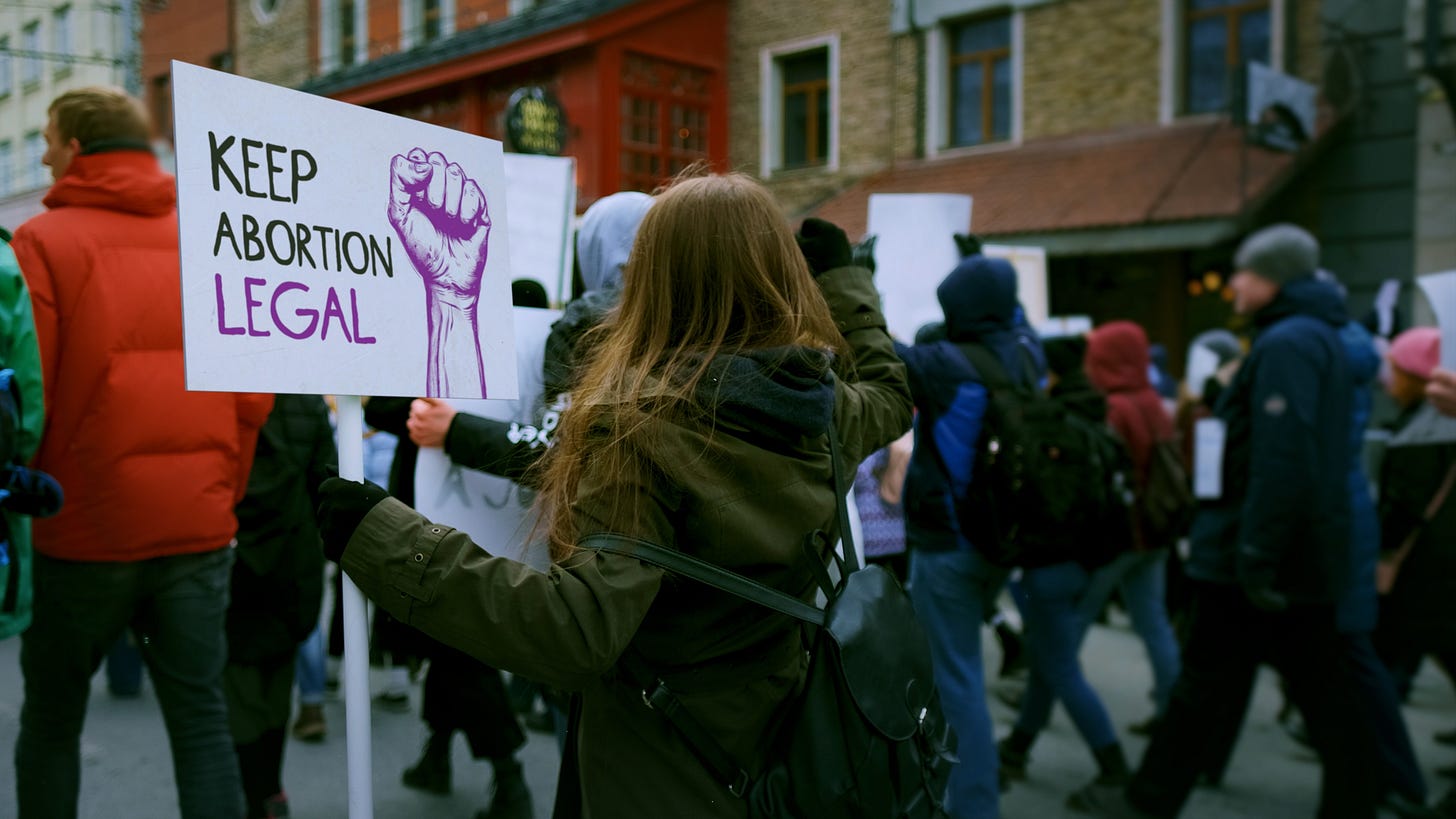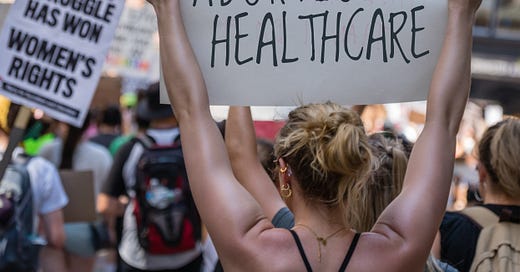The Bible Is Pro-Choice, Let's Stop Pretending It Is Pro-Life
Why Scripture, Science, and Human Rights All Affirm Reproductive Autonomy"
The Catholic Church threatened to excommunicate any Priest who reports child abuse confessions to authorities under a new Child Abuse Reporting law in Washington. We can only wish the Catholic Church cared as much for the born as the fetus.
While modern Christian pro-life rhetoric claims biblical support, a closer look at Christian Scripture reveals that the Bible neither establishes personhood at conception nor prohibits abortion. In several cases, it implies conditional views on fetal life, supporting a more complicated but pro-choice value system.
The Judeo-Christian tradition, as well as Islam, are religions that are mostly about helping the poor and seeking economic justice which never included tax cuts for the rich. Nor is the Bible very concerned with sexuality, heaven, hell or prayer; these are things that modern Christians obsess about because they perpetuate poverty and injustice. Here’s a sample of the 2,000 Bible verses about helping the poor and seeking justice:
Proverbs 14:31 “Whoever oppresses the poor shows contempt for their Maker, but whoever is kind to the needy honors God.”
Isaiah 58:6–7 God calls true worship acts of justice: “loose the chains of injustice.. share your food with the hungry.”
Amos 5:24 “Let justice roll on like a river, righteousness like a never-failing stream!”
Matthew 25:35–40 Jesus equates caring for the poor with serving Him directly: “I was hungry and you gave me something to eat.”
Luke 4:18 Jesus begins his ministry by declaring: “He has anointed me to proclaim good news to the poor.”
Acts 2:44–45 The early church shared everything in common and gave to anyone in need.
James 2:5–6 “Has not God chosen those who are poor in the eyes of the world to be rich in faith?”
Extremist Christians interpret the Bible as an Authority on Fetal Rights for political expediency but the plain text of the Bible is clearly Pro-Choice. Human Rights & Healthcare are paramount.

Exodus 21:22–25 provides a striking example. If men are fighting and accidentally strike a pregnant woman, causing a miscarriage, the offender pays a fine, unless further harm comes to the woman. At that point, the punishment escalate to "life for life." This law clearly distinguishes between the life of the fetus and that of the mother, clearly showing that fetal life was not considered equivalent to a full human life.
In Numbers 5:11–31, the ritual for a woman suspected of adultery involves drinking a bitter potion that, if she is guilty, may cause her womb to miscarry. This procedure is ordained by God, and yet it includes a possible abortion as a consequence. Rather than being condemned, it is embedded in divine law, highlighting that under certain circumstances, the termination of a pregnancy was acceptable.
Further passages such as Hosea 9:14 and 13:16 use miscarriage and violence against pregnant women as images of divine judgment. While disturbing, these texts suggest that the loss of fetal life was not regarded as an absolute moral evil in biblical thought.
Job 3:16 and Ecclesiastes 6:3–5 portray stillbirth not as a tragedy, but as a rest from suffering. Job laments that he wasn’t “hidden away like a stillborn child,” and Ecclesiastes says the stillborn is “better off” than a person who lives a long, meaningless life. These texts challenge the idea that life before birth is inherently and unconditionally valuable.
One of the most notable features of the Bible on this issue is its silence. Despite its comprehensive moral laws, the Bible never explicitly forbids abortion. If it were inherently immoral, one would expect it to appear in the moral codes of the Torah or the ethical teachings of Jesus.
Finally, the Bible consistently upholds the dignity and moral agency of women. From Eve's choices in Genesis to Jesus' respectful and empowering interactions with women in the Gospels, Scripture presents women as capable of making complex moral decisions, including those about their bodies and futures.
While Scripture values life, it does not provide a blanket prohibition on abortion, nor does it define fetal life as equal in worth to life after birth. Instead, it presents a complex ethic that considers justice, context, and human agency. A biblically informed view on abortion, then, can be both faithful and pro-choice.
Right-wing propaganda uses guilt to sway people, but their arguments are shallow and fear-based. For example, calling others “baby killers” is falsely equating a fetus with a living child. Telling parishioners that someone who has an abortion will “burn to hell!” is simply false, the Bible says no such thing, far from it in fact. Criminalizing abortion is a drastic approach to try to affirm their extremist ideology. Just because a government has the power to criminalize women or doctors does not mean they have the ethical or moral justification to do so.
The Politically and Socially Strategic Rise of Abortion as a Central Issue in American Christianity
In the early 20th century and well into the 1960s, abortion was not a primary concern for most American Christians, including evangelical Protestants. It was considered a personal or morally ambiguous issue. Even after the Supreme Court’s 1973 decision in Roe v. Wade, which legalized abortion nationwide, evangelical leaders largely responded with indifference or saw it as a matter of individual conscience. However, by the 1980s, abortion had become the defining moral and political issue for conservative Christians, due in large part to the efforts of organizations like the Christian Coalition. This dramatic shift was not the result of theological revelation, but rather a calculated political realignment with significant financial and social implications.
The initial catalyst for the rise of the religious right was not abortion but resistance to racial integration. In the 1970s, the IRS began revoking the tax-exempt status of private Christian schools that practiced racial discrimination. Leaders like Jerry Falwell and Paul Weyrich recognized that framing their movement around opposition to desegregation was politically untenable. Instead, they identified abortion as a more morally compelling and publicly acceptable cause around which to rally conservative Christians.
Abortion provided a unifying issue for Catholics and evangelicals, two groups historically at odds. By framing the anti-abortion position as a defense of “innocent life,” political strategists could build a powerful, values-based coalition. This effort was instrumental in mobilizing support for Ronald Reagan in 1980 and laid the groundwork for the Christian Coalition’s founding in 1989. Abortion quickly became the moral litmus test for Christian political engagement, even though it had not been treated that way historically.
Financial dynamics also played a role in this shift. Poorer Americans, who are more likely to face unintended pregnancies and seek abortions donate more of their income to church than wealthier Americans. By turning abortion into a moral issue, churches reinforced a cycle of guilt, repentance, and financial giving that created dependency on the poor to stay in business. The pro-life stance thus served both a moral and structural function in sustaining church communities. After all, in America, “church” is big business with tax free income as well.
The rise of anti-abortion politics aligned with Conservative goals around gender roles and family structure. Restricting abortion helped reinforce a vision of womanhood centered on motherhood and submission, consistent with patriarchal interpretations of Scripture. This cultural ideal supported traditional authority structures within both the home and the church.
The Christian Coalition’s elevation of abortion to the forefront of Christian political identity was not a spontaneous theological movement but a strategic and pragmatic decision. Rooted in resistance to desegregation, amplified by political opportunity, and reinforced by financial and cultural systems, the shift revealed how religious rhetoric can be mobilized to serve broader ideological ends. Understanding this history challenges the assumption that the modern Christian pro-life position is rooted in unchanging biblical principles and opens the door to a more nuanced and historically informed ethical discussion.

From a broader perspective, modern science strongly supports a pro-choice position. Embryology and neuroscience show that while a fetus develops rapidly, it does not have the neurological capacity for consciousness, pain perception, or self-awareness until well into the third trimester, well after most abortions occur. The scientific consensus also emphasizes the health and autonomy of the pregnant person, whose life, wellbeing, and bodily integrity are unambiguously established and protected by law.
Sociologically, access to abortion is a cornerstone of gender equality. Nations with legal, safe abortion services consistently show better outcomes in maternal health, educational attainment, economic stability, and child welfare. Criminalizing abortion does not reduce its occurrence; it only makes it unsafe. Restricting abortion disproportionately harms marginalized women, including those who are poor, young, or from communities of color.
From a human rights perspective, reproductive freedom is essential to women’s autonomy and equality. Denying someone the right to control their reproductive life is a form of state coercion that limits educational and economic opportunities, traps people in cycles of poverty, and violates bodily autonomy. International human rights organizations increasingly recognize access to abortion as a matter of fundamental rights.
In terms of healthcare, abortion is one of the safest medical procedures when done legally. Restrictive laws force people to seek unsafe alternatives, increasing the risk of injury and death. Medical professionals overwhelmingly support keeping abortion safe, legal, and accessible as part of comprehensive reproductive care.
For all these reasons, the legalization of abortion should be enshrined in our Constitution, not merely tolerated, but protected as a core element of justice and equality. Constitutional protection ensures that reproductive rights are not vulnerable to shifting political winds or religious lobbying. It affirms that decisions about pregnancy belong to individuals, not institutions, and that bodily autonomy is a cornerstone of a free and fair society.
The Christian right’s embrace of abortion as a political rallying cry was a strategic maneuver, not a theological discovery. But beyond this, a truly ethical and democratic society must affirm reproductive choice through science, human rights, healthcare, and constitutional law. Reproductive justice is not only moral, it is essential to freedom, dignity, and equality for all Americans, and for all women around the globe.



